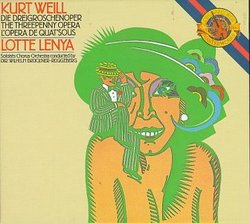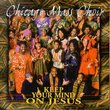| All Artists: Lotte Lenya Title: Weill - Die Dreigroschenoper (The Threepenny Opera) Members Wishing: 0 Total Copies: 0 Label: CBS Release Date: 12/29/1989 Genres: Classical, Broadway & Vocalists Styles: Opera & Classical Vocal, Musicals Number of Discs: 1 SwapaCD Credits: 1 UPC: 074644263725 |
Search - Lotte Lenya :: Weill - Die Dreigroschenoper (The Threepenny Opera)
 | Lotte Lenya Weill - Die Dreigroschenoper (The Threepenny Opera) Genres: Classical, Broadway & Vocalists
|
Larger Image |
CD DetailsSimilarly Requested CDs |
CD ReviewsHervorragend! William White | B-1200 Brussels Belgium | 09/05/2000 (5 out of 5 stars) "I first listened to this recording on an LP of my parents' from the 1960s. The work was created by not one but two greats: Brecht and Weill, while Lotte Lenya worked closely with Brecht during his career.It really does sound as if it was recorded a long time ago, but somehow you don't want this opera to be 'smooth'. It also really sounds much better in German than in English. It has won over certain friends of mine who usually don't listen to [good] music of any sort. It manages to sound simultaneously (1) as if it was recorded in a church hall by a cast of chain-smokers (2) spot-on, tight, and flawlessly performed, which is not easy with Weill when he messes around with strange harmonies.If there's one language in which it sounds even rougher and better than German, it's [mandarin] Chinese. Nearly two years ago I had the privilege of seeing this work performed, for the first time in my life. It was done by Beijing Youth Theatre as part of a festival in Hong Kong, directed by Chen Yong, a real veteran director. Not only did it relate perfectly to a lot of things in mainland China, but it was also performed by people who really knew what they were doing." The Ultimate Threepenny Opera Deborah S. Gers | Flemington, NJ United States | 10/26/2001 (5 out of 5 stars) "Kurt Weill was once quoted as saying "there are only two kinds of music - good music and bad music". This is great music whipped into a frenzy - the Threepenny Opera as true opera and not as a musical play. The casting is superb, a direct reflection of Lotte Lenya's musical supervision of the project. It is one of the few complete recordings of the work, including both the "Jealousy Duet", often omitted because of the vocal demands placed on the performers, and the Ballad of Sexual Dependency, usually omitted because of its frank content.Lotte Lenya steals the show. Pirate Jenny has an almost maniacal lilt in the final verse. The Tango Ballade hits its full stride only after Lenya's voice takes over the lead. Her delivery of, perhaps, Brecht's most famous line; "erst kommt das fressen, dann kommt die moral" in the Ballad "What Keeps Mankind Alive" is as authoritative as Brecht could ever hope it to be. Lenya's exploitation of the musical interval of a tritone at "Rocke heben" adds a lifetime of experience and conviction to the work.Not to be overlooked is the excellent musical direction of Wilhelm Bruckner-Ruggeberg of the musicians and singers. Trude Hesterburg as Frau Peachum delivers a delightful performance of the Ballad of Sexual Dependency, and the Peachum family triumphs in the finale to Act I, the Uncertainty of Human Conditions. A true virtuoso performance all around.Kurt Weill suceeded beyond his wildest dreams - he truly was the poor man's Verdi." The way it oughtta be! Donald C. Allen | Carlisle, MA USA | 12/11/1999 (5 out of 5 stars) "This is the Threepenny Opera done right. If you love this music, this recording is a must, even if you have the recording of the Blitzstein English adaptation. Great as Blitzstein's version is, you don't get the full pungency of this incredible work without hearing it in German."
|

 Track Listings (26) - Disc #1
Track Listings (26) - Disc #1

